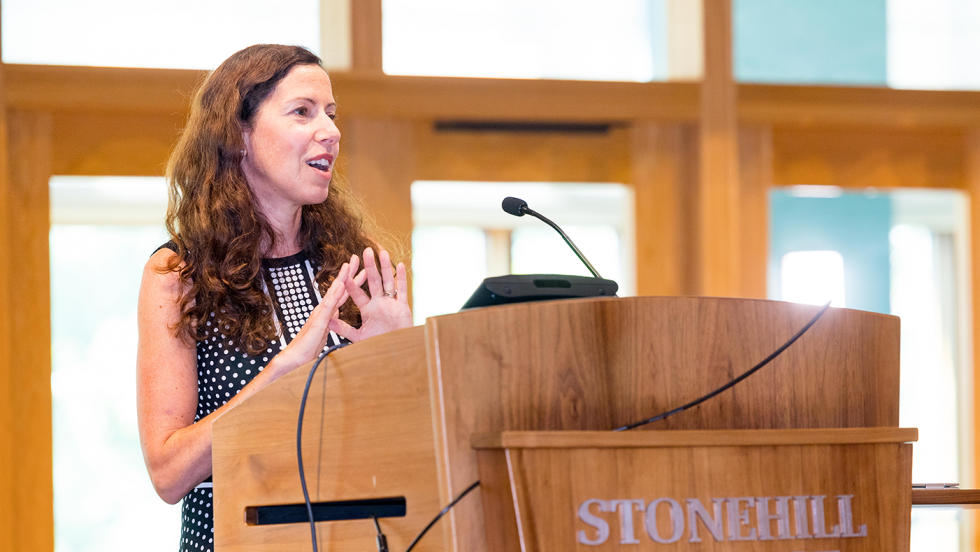10 Things to Know About Sarah Gracombe
Meet the faculty member who has the honor of overseeing Stonehill College’s Moreau scholars.
When she was a student at Brown University, Professor of English Sarah Gracombe completed an honors thesis as part of her course requirements. The work explored the purpose of art and whether artists have any obligation to society.
“The project taught me the challenges and pleasures of long-term research,” she said. “I got to collaborate with amazing faculty from the English and Art History departments. That work continues to inform what I do at Stonehill College.”
In her role as director of the Moreau Honors Program (MHP), Gracombe is responsible for engaging students through active learning experiences designed to help them grow as creative and independent thinkers. While she continues building this program, here are 10 things to know about her.
Gracombe chats with a group of students at a welcome luncheon held in August 2022 to celebrate the arrival of the Class of 2026's Moreau scholars.
1. She loves connecting with students. Gracombe became the director of the MHP in 2021 after leading the Integrating Democratic Education at Stonehill (IDEAS) program for five years. “I was looking for a new challenge and another opportunity to connect with students across disciplines, something I loved doing as director of IDEAS,” she said. “The MHP seemed like the type of program that would allow me to meet, support and work with a variety of interested, interesting students.”
2. She helps scholars discover new ways of thinking. Now settled into her role as director after a year on the job, Gracombe wants to expand the MHP by crafting a curriculum that offers interdisciplinary learning opportunities. “I believe part of my job is to help students think about the ways in which different issues, ideas and lines of inquiry are relevant to their lives and to help them think about how what is relevant to them can be broader and more diverse than they might think,” she said.
3. She seeks to create dynamic experiences. Though the MHP is primarily known for offering its members rigorous, engaging academic experiences, students enjoy several other benefits, including participation in honors-specific extracurricular activities and leadership grant opportunities. It is Gracombe’s job to ensure these experiences remain available to them. “The program is embedded in and draws beneficially from so many different parts of campus,” she said. “Serving as director has allowed me to interact with a lot of offices, all wanting to help us create the best experience possible.”
4. She is a collaborator. The Office of Undergraduate Admission is one of the many departments with whom Gracombe collaborates. Together, they decide who is admitted to the MHP upon acceptance to Stonehill. “Moreau scholars are students who aren’t only motivated by academic success, but also by intellectual curiosity,” she said. “We value students who are engaged with and informed about local communities and global issues.”
5. She was destined to teach. Coming from a family full of teachers, including a father who was a professor of electrical engineering, Gracombe always had an inkling that she would become an educator. “I grew up with a respect for learning and an enthusiasm for what it means to invite other people into the process,” she said. “I’ve always loved having the opportunity to talk about books, culture and history. I knew I wanted to explore that in some way through my work.”
Gracombe peruses a 19th century journal in the MacPháidín Library.
6. She has worked outside of academia. Before becoming a professor, Gracombe completed an internship with the National Endowment for the Arts in Washington, D.C. This federal agency funds projects meant to help all Americans find opportunities for arts participation. After that experience, she spent some time working for a cultural policy think tank based in the nation’s capital.
7. She believes challenge and comfort go hand in hand. Gracombe has taught English courses at Stonehill since 2005. During her tenure, she has learned an important lesson about challenging herself and others. “Challenge and comfort are not mutually opposed, but mutually supportive,” she said. “While we need to push students to question their own assumptions and develop their ideas further, we also need to create an environment of support and inclusivity.”
8. She is fascinated by Victorian England. Much of Gracombe’s work as a literary scholar has focused on the 19th century. She often teaches courses that explore the interaction of Victorian literature and important issues tied to the era’s culture, such as national identity or psychology. “There’s something about the Victorian period that’s both uncannily familiar, but also different,” she said. “This period has had a tremendous influence on the structures of our lives, the way we think, communicate, and understand our place in the world.”
9. She is not scared of vampires. As she is so drawn to the Victorian era, one might assume that Gracombe’s favorite book to teach would be something like Great Expectations or Jane Eyre; while she enjoys those works, one of her favorite novels to teach is Bram Stoker’s Dracula. “The novel makes us ask questions about mental health, what it means to desire something that is considered taboo, encountering other cultures, and the pressures of colonialism,” she said.
10. She enjoys the great outdoors. When she is not working, Gracombe enjoys staying active. “My family and I got to hike in the Rockies during the summer of 2022,” she said. “We had never been there before. We loved it. It was so beautiful.”
